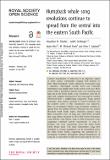Humpback whale song revolutions continue to spread from the central into the eastern South Pacific
Abstract
Cultural transmission of behaviour is an important aspect of many animal communities ranging from humans to birds. Male humpback whales (Megaptera novaeangliae) sing a repetitive, stereotyped, socially learnt and culturally transmitted song display that slowly evolves each year. Most males within a population sing the same, slow-evolving song type; but in the South Pacific, song ‘revolutions’ have led to rapid and complete replacement of one song type by another introduced from a neighbouring population. Songs spread eastwards, from eastern Australia to French Polynesia, but the easterly extent of this transmission was unknown. Here, we investigated whether song revolutions continue to spread from the central (French Polynesia) into the eastern (Ecuador) South Pacific region. Similarity analyses using three consecutive years of song data (2016–2018) revealed that song themes recorded in 2016–2018 French Polynesian song matched song themes sung in 2018 Ecuadorian song, suggesting continued easterly transmission of song to Ecuador, and vocal connectivity across the entire South Pacific Ocean basin. This study demonstrates songs first identified in western populations can be transmitted across the entire South Pacific, supporting the potential for a circumpolar Southern Hemisphere cultural transmission of song and a vocal culture rivalled in its extent only by our own.
Citation
Schulze , J N , Denkinger , J , Oña , J , Poole , M & Garland , E C 2022 , ' Humpback whale song revolutions continue to spread from the central into the eastern South Pacific ' , Royal Society Open Science , vol. 9 , no. 8 , 220158 . https://doi.org/10.1098/rsos.220158
Publication
Royal Society Open Science
Status
Peer reviewed
ISSN
2054-5703Type
Journal article
Description
Funding: COCIBA grants of USFQ National Geographic Society - W396-15; NERC Sea Mammal Research Unit - NE/R015007/1; Project CETACEA Ecuador Royal Society - NF140667, UF160081; Rufford Foundation.Collections
Items in the St Andrews Research Repository are protected by copyright, with all rights reserved, unless otherwise indicated.

